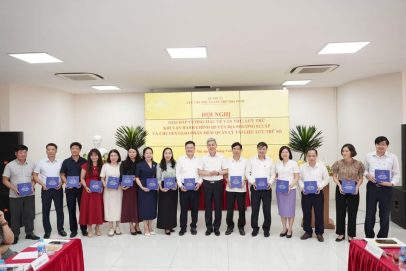FPT Expert: ‘Vietnam has the opportunity and potential to build a smart legal system powered by AI and Big Data’”
On August 22 in Hanoi, the Ministry of Justice held a thematic workshop titled “Enhancing the Effectiveness of Law Enforcement to Meet the Demands of National Development in the New Era.” At the event, Dr. Pham Quang Nhat Minh, Director of the AI Research and Development Center at FPT IS, FPT Corporation, shared insights on strengthening digital transformation and the application of artificial intelligence and big data in lawmaking and law enforcement.
The Ministry of Justice recently issued Decision No. 1948/QĐ-BTP approving its Action Plan to implement Plan No. 02 of the Central Steering Committee on the development of science, technology, innovation, and digital transformation. The plan aims to promote interconnected, synchronized, rapid, and effective digital transformation in line with the restructuring of the political system. Accordingly, the Ministry of Justice’s Action Plan will be implemented in two phases with clear and specific objectives, reflecting the Ministry’s thorough investment and strong determination to leverage technology in building a smart and efficient rule-of-law system.
Deputy Minister of Justice Dang Hoang Oanh delivered the opening remarks at the event
Speaking at the event, Deputy Minister of Justice Dang Hoang Oanh emphasized: “In a world undergoing transformative changes, for our nation to advance firmly into a new era – an era of breakthrough development, prosperity, and strength under the leadership of the Party, it is essential to adopt a comprehensive perspective on the organization of law enforcement, from theoretical foundations to practical implementation. Today’s workshop has been convened to assess the current state of law enforcement practices, to review achievements, identify existing limitations and their causes across ministries, sectors, and localities, and from there propose feasible and effective solutions to enhance law enforcement efficiency and improve the legal framework for law enforcement organization in Vietnam in this new era.”
At the workshop, representatives from the Ministry of Justice and various enterprises exchanged views and put forward initiatives to modernize state governance and improve the effectiveness of lawmaking and law enforcement. Representing FPT, Dr. Pham Quang Nhat Minh – Director of the Artificial Intelligence Research and Development Center, FPT IS, FPT Corporation – shared insights on accelerating digital transformation and applying artificial intelligence and big data in the development and enforcement of laws.
Representing FPT, Dr. Pham Quang Nhat Minh contributed insights on strengthening digital transformation in the development and enforcement of laws
At the outset of his presentation, the FPT expert emphasized that amid the sweeping wave of digital transformation, Vietnam’s legal system stands before both tremendous opportunities and significant challenges. The rapid advancement of artificial intelligence (AI), big data, and emerging digital-economy models such as fintech, cryptocurrency, and e-commerce is profoundly reshaping society, demanding that the legal framework adapt with speed and agility. In parallel, global issues such as climate change, personal data protection, and sustainable development further underscore the urgent need for innovation in the way laws are formulated and enforced.
Dr. Minh noted that although the Ministry of Justice has made progress in drafting, reviewing, and appraising legal documents, as well as in the early adoption of digital technologies, multiple limitations remain. Vietnam’s legal system is still burdened by overlaps and inconsistencies, while the sheer volume of legal documents makes them difficult to search and apply uniformly. Legal officers lack modern analytical tools, while citizens and businesses face barriers in accessing legal information. In addition, legal data remains fragmented, poorly connected, and underutilized in assessing enforcement practices, leading to policies that may not fully align with real-world needs.
Against this backdrop, the application of AI and big data emerges as a breakthrough solution to modernize legal governance. Dr. Minh’s presentation highlighted several key directions: building a standardized, nationwide legal database; developing a digital legal knowledge base to underpin intelligent applications; deploying AI to detect conflicts among legal documents and analyze enforcement data to provide early warnings; and implementing virtual legal assistants to make regulations more accessible to citizens and businesses. These innovations, he stressed, would not only ease the workload of public authorities and enhance the quality of law-making and enforcement, but also strengthen transparency and accessibility of laws in the digital society.
Crucially, the FPT expert drew attention to international experience as clear evidence of this trend’s feasibility. The European Union, the United States, China, and Estonia have all successfully applied AI and big data in their legal systems,from digitizing millions of legal documents to developing smart legal assistant platforms. A common factor behind these successes, he emphasized, lies in standardized, interoperable, and secure data infrastructure, providing a solid foundation for the sustainable growth of legal technologies.
FPT reaffirms its commitment to supporting the Ministry of Justice in advancing comprehensive digital transformation
In Vietnam, FPT has been actively supporting the Ministry of Justice through multiple digital transformation initiatives, most notably the Electronic Receipt System for Civil Judgment Enforcement. Within just 30 days, FPT successfully deployed the system nationwide, integrating AI-OCR, digital signatures, and centralized storage. This solution fully automated the receipt issuance process, shortened processing time, enhanced transparency, and enabled real-time decision-making for leaders. Remarkably, in the very first week of operation, nearly 3,000 electronic receipts were issued with a total value of nearly VND 2 trillion, underscoring FPT’s technological capability and execution speed in the legal domain.
At the same time, FPT has developed the FPT AI Factory platform, powered by advanced GPU infrastructure capable of training and operating generative AI and large language models (LLMs) optimized for Vietnamese. Designed for deployment in private cloud environments, the system ensures data sovereignty—a critical requirement for the public sector. On this platform, FPT has built AI Agent solutions that can analyze management data, allow leaders to query in natural language, and automatically generate reports. Such tools are highly applicable in the legal sector, helping ease administrative workload and improve operational efficiency.
From both practice and research, FPT experts also put forward several macro-level recommendations: improving the legal framework to accelerate technology adoption in the justice sector, including legislation on legal data, a decree on a unified nationwide database, and sandbox mechanisms for legal AI applications; fostering public–private partnerships to mobilize resources and develop digital legal platforms; and prioritizing the development of human resources with “dual expertise” in both law and technology. As emphasized, only with a workforce fluent in both domains can digital transformation in the legal sector be carried out effectively and sustainably.
Concluding the presentation, FPT’s expert affirmed that digital transformation and AI are becoming indispensable tools to enhance the effectiveness of law enforcement, bring the law closer to citizens, and build a modern, transparent judicial administration.
As Vietnam’s leading technology corporation, FPT has consistently partnered with the Ministry of Justice in applying digital solutions—from online examination platforms for the nationwide “Learn about the Ministry of Justice” competition to the Electronic Receipt System for civil judgment enforcement—demonstrating technology’s crucial role in modernizing the justice sector.
FPT reaffirms its commitment to accompanying the Ministry of Justice in the journey toward comprehensive digital transformation—from building a national legal database, developing virtual legal assistants, to deploying advanced data analytics systems and smart legal education platforms. These efforts not only contribute to the modernization of the justice sector but also mark an important step in advancing the socialist rule-of-law state in line with Resolution No. 57-NQ/TW on breakthroughs in science, technology, innovation, and national digital transformation, and Resolution No. 66-NQ/TW on reforming lawmaking and law enforcement to meet the country’s development needs in the new era.

















